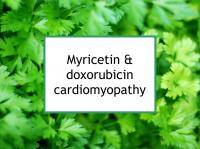Myricetin is a flavonol found in a variety of berries and other plant-based foods. It has been shown to trigger programmed cell death in hormone receptor positive (ER+/PR+) and triple negative (ER-/PR-/HER2-) breast cancer cells. Now a new study has reported that myricetin reduces heart damage induced by doxorubicin in an animal model of chemotherapy.
In addition to causing ER+/PR+ and triple negative cell death, myricetin has been reported to inhibit triple negative breast cancer cell migration, invasion, and adhesion and also reduce tumor growth and metastasis in a mouse model of triple negative breast cancer. Myricetin has also been shown to increase the oral bioavailability of docetaxel in rats, enhance the cytotoxic treatment effects of paclitaxel in ovarian cancer cells, and interfere with tumor cell immortality by preventing telomere extension.
Best food sources of myricetin
Below are foods recommended for breast cancer patients and survivors that are abundant sources of myricetin:
Myricetin is also found in significant concentrations in fennel and some berry wines, but we do not recommend these (click on the links to reach the applicable pages in this website).
Other flavonols that inhibit doxorubicin-induced cardiomyopathy
Flavonols such as myricetin are a type of flavonoid, pigments found in a wide variety of plants. The following flavonols have also been reported to inhibit doxorubicin-induced heart damage:
- Fisetin (found, for example, in apples, grapes, kiwifruit, red or white onions, strawberries)
- Kaempferol (arugula, chives, greens, kale, leeks, saffron, watercress)
- Quercetin (black currants, buckwheat, hot peppers, Mexican oregano, all types of onions, raspberries, romaine lettuce).
Latest research reports myricetin inhibits cardiomyopathy
The study referenced above was designed to investigate the potential of myricetin to mitigate doxorubicin-induced cardiotoxicity in rats. To conduct the study, the authors administered myricetin to rats daily for nine days. Doxorubicin was also administered on days 1, 3, 5, 7, and 9. At the end of treatment on day 10, blood flow and measures of cardiovascular function were recorded, and blood and heart tissues were collected. Oxidative stress markers and proinflammatory cytokines were also measured and myocardial histopathology was assessed.
Myricetin was found to significantly reduce doxorubicin-induced electrocardiogram alterations (in ST segment height) and also reduce serum SGPT (a measure of liver inflammation), SGOT (liver damage), CK-MB (cardiac tissue damage), and LDH (tissue damage) levels. Myricetin also improved measures of oxidative stress and antioxidant status in cardiac tissue. In addition, myricetin lowered measures of inflammation and improved histopathological features.
The findings indicate that myricetin effectively counteracts doxorubicin-induced myocardial injury by suppressing NF-κB-mediated inflammatory pathways and oxidative stress. The authors conclude that myricetin mitigates doxorubicin-induced heart muscle damage through antioxidant and anti-inflammatory mechanisms involving inhibition of NF-κB signaling.
Please see our article on Foods to eat and avoid during doxorubicin chemotherapy and the myricetin tag for more information.
